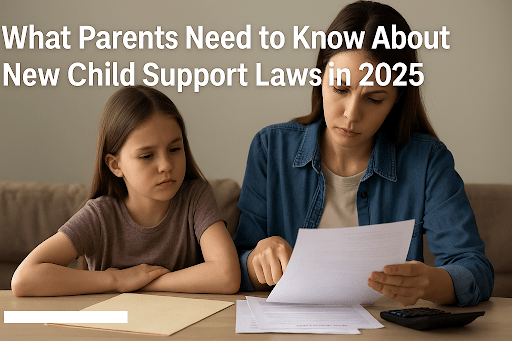Raising a child takes time, care, and money. When parents split up, child support helps ensure the child’s needs are met. Courts use rules to decide how much one parent should pay. These rules change over time.
In 2025, many states updated how they handle child support. The goal is to be fair to both parents and make sure children receive proper care. If you pay or receive support, you should understand the changes. This article breaks down the key points in clear terms. It can help you prepare for court or adjust your current plan.
Why the Changes Matter
Child support is more than money. It affects housing, school, food, and daily care. It also shapes how parents share responsibility. When the law changes, it can impact both sides of the agreement.
Some parents now pay more. Others see lower amounts. The updates take a closer look at each family’s full picture. Courts no longer follow a one-size-fits-all formula. Instead, they weigh income, time spent with the child, and other key factors.
One big change in many states is the way shared parenting is counted. If both parents spend equal time with the child, the payment amounts may shift. In the past, even parents who had joint custody often paid the same as those with limited contact. That has now changed.
You can read a breakdown of these New Child Support Laws 2025 and see how each update could affect your current or future case.
What Has Changed in 2025?
Here are some of the most important updates:
- Income Reporting Rules Are Stricter
Courts now ask for more proof of income. They may include money from gig jobs, online work, or rental properties. This helps prevent underreporting. Both parents must give full records. - More States Use a Shared Parenting Formula
More states now consider the number of nights each parent spends with the child. If both parents share custody evenly, support amounts may drop. The focus is now on time and resources, not just who earns more. - Health Costs and Childcare Are a Bigger Factor
Judges now give more weight to medical care and day care expenses. These costs can shift the support amount up or down. Parents must list these clearly when they submit paperwork. - Adjustments Happen Faster
Many states have lowered the time it takes to request a change. In the past, you had to wait a full year. Now, if your income or the child’s needs change, you may request an update sooner. This keeps payments fair and current. - State Rules Are Easier to Compare
Some states now align their laws to match neighboring ones. This helps in cases where parents live in different places. If you live in one state and your co-parent lives in another, your case may be simpler to manage.
You can learn more about your local state updates in this family law section, which covers changes across multiple regions.
What Parents Should Do Now
These new laws may help or hurt your case depending on your situation. That’s why it’s smart to act early.
- Review Your Current Agreement
If your income or your child’s needs have changed, see if your agreement still makes sense. A small shift could make a big difference. - Gather Clear Records
Keep proof of income, costs, and parenting time. Courts use these facts when they decide on changes. - Don’t Wait to Ask Questions
Even if your case is old, the new rules may still apply. Ask a legal expert if your current order can be updated. - Talk With Your Co-Parent
If you and your co-parent get along, you may agree to new terms without a long court battle. Just be sure to put changes in writing and get court approval.
Final Thoughts
Child support rules always aim to meet the needs of children. The 2025 updates reflect how parenting, income, and daily life have changed. Courts want to make support more fair, more flexible, and more realistic.
If you are paying or receiving child support, these changes may affect your future. It’s important to know your rights and stay informed. Start with the facts. Keep your records clear. Reach out for help if needed.
Knowing the law gives you power to protect your child and yourself. With the right steps, you can adjust and move forward with more confidence.
